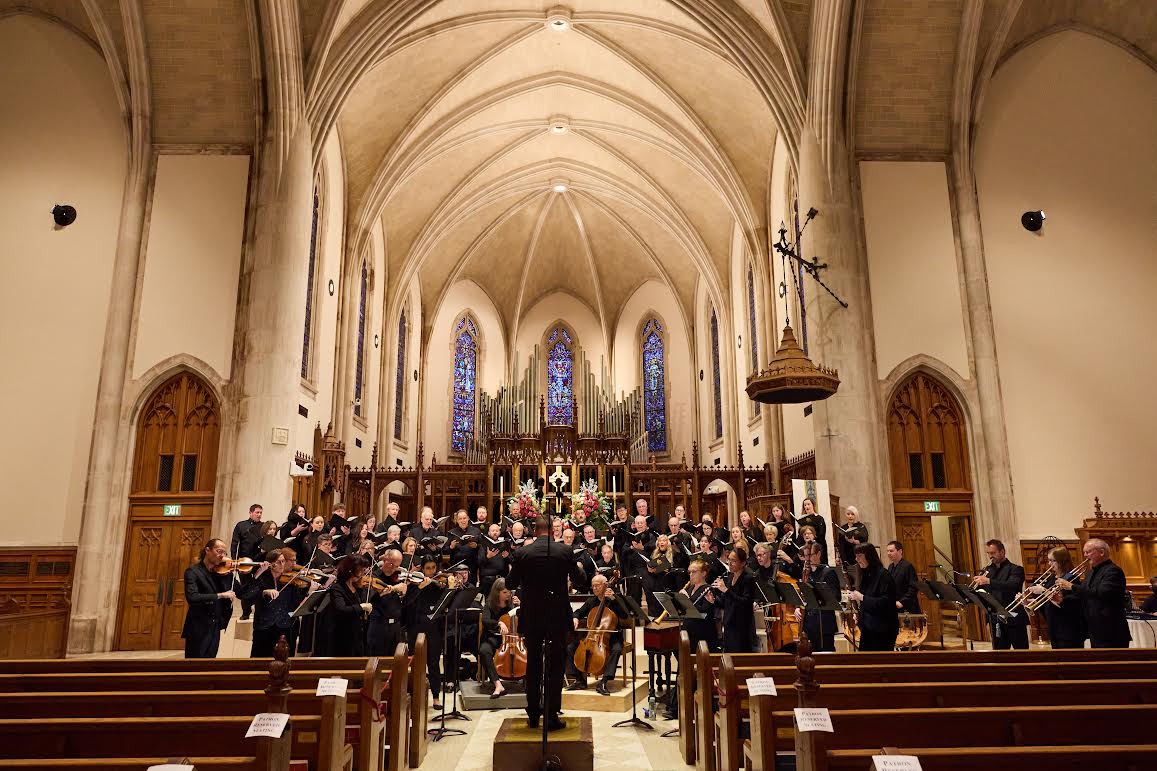The Atlanta Baroque Orchestra launched its 25th season Saturday at its residency location, the Episcopal Cathedral of St. Philip, Atlanta, with a fiery set of beloved classics from Handel and Bach. The well-attended concert saw the orchestra pair with the Cathedral’s own choir and schola (an elite group of vocalists auditioned from within the church’s regular choir) to great effect.
The Cathedral of St. Philip proved once again to be an ideal environment for the orchestra in both its acoustic and atmospheric capacities. As an auditory canvas, it provided the perfect foundation for music that was originally composed to grace such halls. The rich, textural smoothing of tones offered by the vast chamber brings the normally disparate worlds of instruments and choral voices into a ghostly symbiosis in which each takes on characteristics of the other, in so doing blurring the line between human and machine.
From a visual standpoint, the atmosphere could not be more appropriate: The heavenly gothic arches of the Cathedral and smorgasbord of stained glass windows are exactly the world this music envisions.
“Zadok the Priest,” Handel’s stirring coronation anthem, opened the concert, and from the outset it was clear that the Cathedral choir would make the most of what Handel provided. Those extraordinarily rich voices thundered across the chamber with all the angelic fervor the composer intended and served to fully draw the audience into the baroque world that lay ahead.
Handel was a choral arranger par excellence, and he was at his best when he used the winds and brass to punctuate crucial accent points within a vocal melody. With “Zadok the Priest,” Handel employed this signature move to great effect. He created an enduring classic that has been featured at every English coronation since George II, up to and including the recent ascent of Charles III. In the more humble confines of St. Philip, it was nothing short of a mesmerizing opening to what promised to be an enthralling evening.
The classics continued with Handel’s overture to Judas Maccabaeus. Like much of Handel’s work, its core theme is so ubiquitous that even nonclassical listeners will find it familiar. In the context of the evening, however, it was a stark contrast to its predecessor and one that seemed to unnecessarily subdue the evening.
The oboists — Kathryn Montoya and Sarah Huebsch Schilling — emerged as the strongest component of the piece. The overall work is very much a dialogue between sections, and, in this iteration, it felt as though the woodwinds were providing the strongest arguments.
By contrast, the strings lacked cohesion. Throughout the overture, they played along together but lacked the kind of telepathic unity that defines the best ensembles. It was an oddly disconcerting moment for a string section that has always been so formidable in the past. They eventually redeemed themselves as the evening went on, and the mellower sections of Brahms’ Orchestral Suite no. 3 in D Major showed them at their best.
Handel’s “Arrival of the Queen of Sheba” and Organ Concerto Op. 4, No. 2 in B-flat Major were performed as a single piece due to their mutual brevity. Caroline Robinson, the Cathedral of St. Philip organist and associate choirmaster, provided a stunning rendition of the organ concerto with particular emphasis on the solo section.
Handel never allowed his soloists to drift off on their own. A great many composers — even masters like Mozart and Beethoven — regularly compose solos that are just that: stand-alone side tangents that seem to bring the overall overall melodic process to an abrupt halt while the given soloist flexes his or her virtuosic muscles. Handel was never so crude — he provided solos that feel like natural extensions of the established melody and are supported throughout by the wider ensemble.
That integration of soloist and accompaniment afforded Robinson the opportunity to stand out. Her ability to draw focus while never fully standing apart from her fellow players was exactly what the piece needed and stood out as the enthralling highlight of the evening.
Bach’s Orchestral Suite No. 3 in D Major followed and offered a pleasant stylistic departure, but it was clear this was Handel’s evening. Another of his anthems for the coronation of George II, “The King Shall Rejoice,” closed out the night and saw the return of the Cathedral choir. Once again, Handel’s unique capacity for building contrapuntal drama underneath an already riveting choir was on full display.
With the 2023-24 season, the Atlanta Baroque Orchestra celebrates a quarter century of transporting audiences to centuries past. Its residency at St. Philip has proved a fruitful union of genre and location and one that will no doubt continue to buttress the orchestra’s outstanding, period-perfect performances.
::
Jordan Owen began writing about music professionally at the age of 16 in Oxford, Mississippi. A 2006 graduate of the Berklee College of Music, he is a professional guitarist, bandleader and composer. He is currently the lead guitarist for the jazz group Other Strangers, the power metal band Axis of Empires and the melodic death/thrash metal band Century Spawn.

